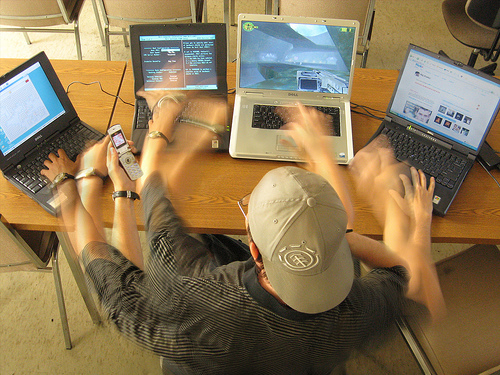YOUR BRAIN ON MULTITASKING

BY EMMA BURKE – Cramming in time for the latest binge-worthy Netflix series, catching up on social media drama and spending time with friends can seem impossible after a long day of classes and homework (especially if you want to get a full night’s sleep). To squeeze more than 24 hours of life out of one day, many of us resort to multitasking. Logically, doing two things at once sounds like an efficient way to accomplish tasks while leaving yourself with enough time to complete the newest BuzzFeed quiz that will predict your career based on your favorite waffle flavor.
As harmless as it may seem, multitasking has a negative effect on our ability to learn and recall information. Recent studies have shown that attempting to do multiple things at once leads to decreased performance in one or more of the tasks. Wood and his team found that students who spend time on Facebook™ or MSN during class tended to do worse on a memory test over lecture material than those who did not. The average scores on the test for those using MSN and Facebook during the lecture were 48% and 50%, respectively. However, texting and sending emails during the lecture did not have a significant impact on memory. The mean score for students texting during the class was 57% and those taking paper and pencil notes was 60%. Researchers attributed the difference in the results to the number of tasks being done at one time. Using MSN or Facebook™ was considered to be multitasking, participants became more off task using these sites than those using email or text messaging, since these tasks did not utilize as many cognitive resources as MSN and Facebook™. It was also found that students who did not use technology during the lecture did better on the memory test than those who did use technology in the classroom.
In another study, it was seen that 96% of participants completed a task faster and more accurately when focused on one test rather than multitasking. However, the data collected by Lin and his research team also showed that age impacts a person’s ability to multitask more effectively. Participants who were ages 13-20 were finished a test more accurately while multitasking than their older counterparts. Males and females of the same age did not have statistically significant differences in accuracy or time. Despite numerous studies highlighting the downside to multitasking, it is a skill praised in modern-day society.
When the human brain is multitasking, it comes at a cost. This Divide and Conquer of mental processes in the brain could lead to an increase in the time it takes to complete a goal or decreased accuracy. A study done by Al-Hashimi and his partners showed that participants with more activity in the superior parietal lobule (SPL) while multitasking had a smaller deficit in performance than those with less activity in this region.This region of the brain is a subset of the parietal lobe and plays a role in attention. Based on fMRI imaging, they hypothesize that that more activity in the SPL allows subjects to better alternate between tasks. Inability to switch between goals results in a cognitive bottleneck, decreasing efficiency and accuracy.
Not only does multitasking result in inefficient cognition, it also can negatively impact the developing brain. A study analyzing media multitasking (MMT) of people ages 13-24 found that those who engage in more MMT on a daily basis have a more difficult time completing a task while distracted. It was also observed that subjects who engage in more MMT have more activity in the right prefrontal cortex while completing an activity. It is not yet known how this will impact the brain post-development, but these results might lead one to speculate that younger generations will have more difficulty focusing in a busy environment.
In today’s fast-paced society, multitasking is being molded into a necessity. Access to information 24/7 via social media has placed an increased value on the younger generation’s ability to complete multiple activities at once, which might come at a price to their developing brains. Even those whose brains are fully developed are not safe from the dangers of multitasking. Trying to meet more than one goal at a time does not increase efficiency, rather, it does just the opposite. So the next time you are in a time crunch, remember to take a break, slow down and focus on one task at a time.
